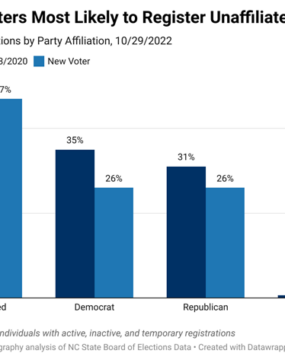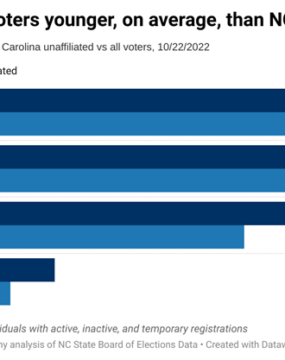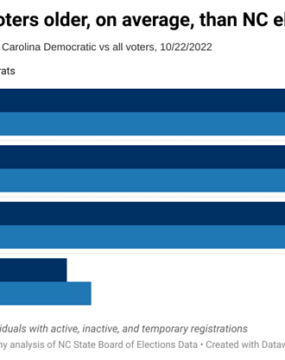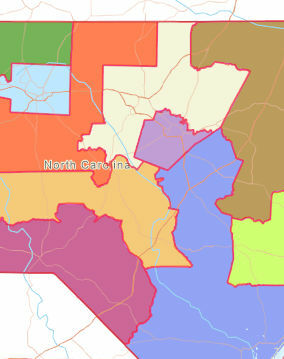Elections & Voting
Keep up with our latest demographic insights

As early voting for the 2022 midterm elections are underway, there have been demographic shifts in North Carolina since the 2020 general elections. With election day coming soon, we’ve broken down the changes by partisan composition and who makes up our newly registered voting population based on voter registration data as of October 29, 2022. First, we should note: our state’s population continues to grow North Carolina has experienced steady population gains since 2020, with net…

This is part of our series looking at NC’s registered voters. Other stories include an in-depth look at NC's Republican voters and an in-depth look at NC's Democratic voters. This is an update of our 2020 piece. As of October 22nd, 2022, North Carolina had 7.4 million registered voters. Of these, 2.6 million or 35.5% were registered unaffiliated. This post examines the characteristics of NC’s unaffiliated voters. Age Younger voters are the most likely to…
This is part of our series looking at NC's registered voters. Other stories include an in-depth look at NC's Democrat voters and an in-depth look at NC's unaffiliated voters. This is an update of our story from August 2020. As of October 22nd, 2022, North Carolina had 7.4 million registered voters. Of these, 2.2 million or 30% were registered as a Republican. Age Younger voters are the least likely to register as Republican, reflecting their…

This is part of our series looking at NC's registered voters. Other stories include an in-depth look at NC's Republican voters and an in-depth look at NC's unaffiliated voters. This is an update of our story from August 2020. As of October 22nd, 2022, North Carolina had 7.4 million registered voters. Of these, 2.5 million or 33.75% were registered as a Democrat. Age Older voters are the most likely to register as a Democrat, partly…

In March, North Carolina passed a fascinating milestone: the number of unaffiliated voters overtook the number of registered Democrats to become the largest voting bloc in the state. There have been a number of good analyses of this shift in North Carolina – we recommend started with this deep-dive from Old North State Politics – and also of the shift nationally. As Gallup reported in January, “At least four in 10 Americans have considered themselves…

Redistricting may be foreign to many citizens, but it plays an important role in the outcome of elections and the legislature that has an effect on our everyday lives. Redistricting is when state legislatures look at the state map and redraw the lines for congressional districts. These districts determine who will be elected for those districts and what type of representation the citizens living in those districts will be receiving over the course of their…

This piece will be updated throughout the week as more questions come in. If you have a question about redistricting (or are a journalist writing a piece) please email demography@unc.edu and we'll do our best to answer your question. We have been receiving a lot of questions concerning redistricting and the upcoming release of the redrawn maps in North Carolina. We’ve talked about redistricting a lot, including what it is, why it’s complicated, and what…

This is the third post in a three-part series previewing redistricting in North Carolina. Earlier posts provide an overview of redistricting and a preview of what redistricting means for NC's House. Typically, redistricting starts in April, but the data delays because of Covid-19 pushed back the redistricting data release to August. Redistricting data from the 2020 census will be released on Aug. 12 at 1 p.m. ET. The redistricting files are expected to be uploaded…

This is the second post in a three-part series previewing redistricting in North Carolina. Other posts provide an overview of redistricting and a preview of what redistricting means for NC's Senate. Typically, redistricting starts in April, but the data delays because of Covid-19 pushed back the redistricting data release to August. Redistricting data from the 2020 census will be released on Aug. 12 at 1 p.m. ET. The redistricting files are expected to be uploaded…

This is the first post in a three-part series previewing redistricting in North Carolina. Other posts preview what redistricting means for NC's House and what redistricting means for NC's Senate. Shortly after the new population numbers come out from the Census, states redraw their legislative district boundaries. This once-a-decade process – called redistricting – ensures that voting districts across the country have an equal number of people in them, to comply with the principle of…
Your support is critical to our mission of measuring, understanding, and predicting population change and its impact. Donate to Carolina Demography today.